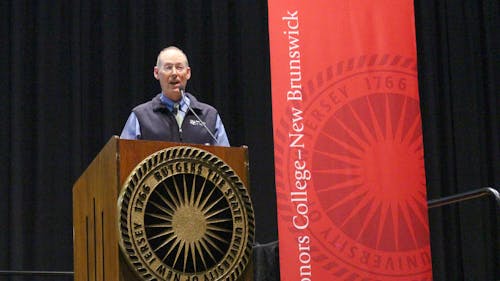Renowned physician addresses health care in underdeveloped nations

Health care is often seen as an economic issue in the United States, but more people should see it as a human rights perspective, said Paul Farmer, who spent several years providing medical services in underdeveloped nations.
Farmer spoke to the University community last night at the College Avenue Gymnasium for the Honors College lecture series, in a talk titled "To Repair the World: Paul Farmer Speaks to the Next Generation."
Donel Young, manager of Marketing and Communications for the Honors College, said the program partnered with the Rutgers Centers for Global Advancement and International Affairs and the Office of Global Health at Robert Wood Johnson Medical School to bring Farmer to the Honors College.
Farmer’s lecture is particularly special as the University celebrates its 250th anniversary that day, Young said.
Farmer spoke about “ways in which the world is broken,” including understanding health care from a human rights perspective and not simply an economic one.
He discussed the economic inequality faced by developing countries when they seek aid.
“It’s cost-effective to treat AIDS in New Jersey versus in Malawi,” he said. “That’s not a cost — that’s a price.”
Farmer was one of the authors on the Honors College's mandatory summer reading list, said Charlotte Zuber, a School of Arts and Sciences first-year student. His book "To Repair the World" was read and analyzed by students in the program.
His work has been influential in creating values she hopes to emulate later in her career, she said.
"(Honors College's mission is to) give students an education where intellectual curiosity, hands-on knowledge, diversity, collaboration and giving back are central to their experience so that they may ultimately have a career with purpose," Young said.
Students not affiliated with the Honors College may have learned about the event through classes that directly relate to Farmer’s worldwide medical practices. Priya Kantesaria, a School of Arts and Sciences junior, learned about the event through her class Global Health Perspectives (GHP).
Francis Barchi, an assistant professor in the School of Social Work, teaches Global Health Perspectives, an undergraduate-level class that details how "biology, behavior, society and the environment" shape human health and well-being, according to its course description.
Farmer discussed several developing countries and said their health care systems were "broken" during the course of the evening.
He highlighted the so-called first-world problems that physicians have and compared them to his work in impoverished countries.
When his colleagues in Boston complain about the overwhelming number of patients they care for, Farmer said he retorts with "at least you don’t have to build your own operating room.”
Miquel-Caitlyn Whooley, a School of Arts and Sciences senior, said sherecently attended a reception with Farmer and eight other students, where she was able to converse with him. She is also enrolled in GHP, which granted her this exclusive opportunity to meet with the physician.
“Farmer gave us valuable information and insight about working in this field and applying our own interests within the framework of global health,” she said.
Farmer discussed Western society’s view on disease outbreaks in developing countries.
“Ebola outbreaks haven’t been about bushmeat eating or traditional practices," he said. "It’s about a lack of stuff. Or staff. Or space. Or systems."
Farmer's work deeply influenced Zuber's core values and career path and will likely do so in the near future, Zuber said.
“To see him in person and hear more stories about his own work will continue to motivate me to find the ways in which I can help and to devote myself to the calls to action that I find,” she said.
Editor's Note: A previous version of this story indirectly quoted Francis Barchi, an assistant professor in the School of Social Work. The author of the article did not interview Barchi.



